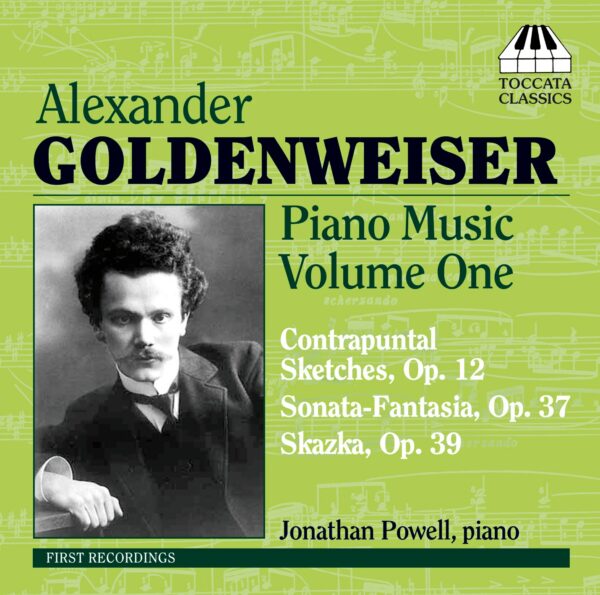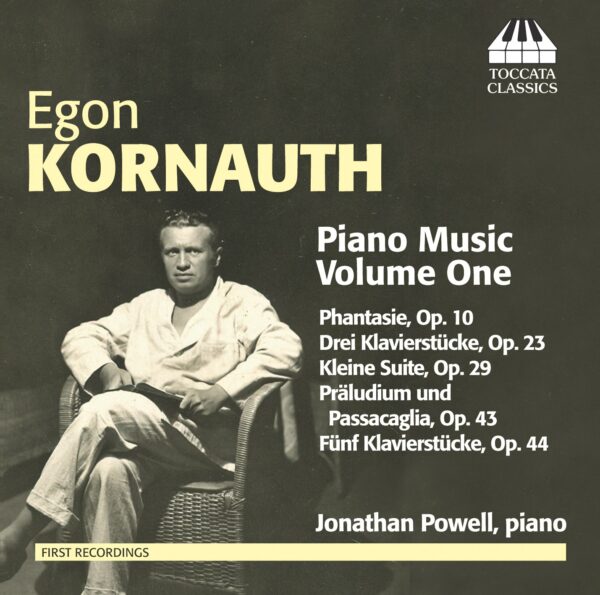Grigory Krein: Piano Music
Grigory Krein (1879–1955), a member of an astonishing dynasty of Russian-Jewish musician-composers, was recognised by his contemporaries as one of the major composers of his day. His piano music charts a stylistic evolution from the early influence of Grieg, Reger (with whom he studied) and Debussy towards a more complex and chromatic language with harmonies that synthesise the sound-worlds of Skryabin and Szymanowski; there’s also an echo of the rhapsodic Celtic wildness of Bax. Indeed, all of these pieces are informed by a remarkable sense of energy – latent in some and given its head in others. .
Jonathan Powell, piano
Listen To This Recording:
-
Deux poèmes, Op. 5b
- No. 1 Drammatico
- No. 2 Andante
- No. 1 Andante con moto
- No. 2 Lento
- No. 3 Allegretto
- No. 4 Andante
- No. 5
- Prélude, Op. 5
- No. 1 Andante
- No. 2 Lento
- Poème, Op. 16
- No. 1 Lento ma non troppo
- No. 2 Mobile
- Cortège mystique, Op. 22
- No. 1 Poème dramatique
- No. 2 Poème lyrique
- No. 3 Poème antique
- Sonata No. 2, Op. 27
Cinq préludes, Op. 5a
Prélude, Op. 5
Deux poèmes, Op. 10 (publ. 1915)
Poème, Op. 16 (1916)
Deux mazurkas, Op. 19 (publ. 1926)
Cortège mystique, Op. 22 (1916)
Trois poèmes, Op. 24
Sonata No. 2, Op. 27 (1924)*
ALL EXCEPT * FIRST RECORDINGS





MusicWeb International :
‘Full of almost all previously unrecorded works, the success of the recital lies squarely with Powell.’
—Jonathan Woolf, MusicWeb International
The New listener :
‘Herrliche Entdeckungen aus der Skrjabin-Nachfolge
Von den drei bedeutenden Komponisten aus der russisch-jüdischen Musiker-Dynastie der Krein-Familie ist Grigori (1879–1955) heute der unbekannteste. Gut die Hälfte seiner Klavier-Solowerke hat nun der britische, für seine unglaublichen Sorabji-Einspielungen ausgezeichnete Pianist Jonathan Powell auf Toccata Classics herausgebracht, darunter die 2. Sonate, die zu den faszinierendsten russischen Klavierkompositionen ihrer Zeit zählen darf. Abgesehen davon hören wir 60 Minuten Erstaufnahmen. […]
Bis zu diesem Punkt hat Jonathan Powell bereits eine gute Stunde bisher nicht auf Tonträgern eingespielter Musik vorgestellt. Am Schluss dann noch das Hauptwerk: Grigori Kreins 24-minütige 2. Sonate (1924). Sie ragt, nicht nur vom Umfang her, über viele einsätzige Sonaten der Zeit weit hinaus, selbst die von Nikolai Roslavets oder Samuil Feinberg. Bestechend, wie hier ein riesiger Sonatenhauptsatz sehr verschiedene Elemente konsequent verarbeitet, mit stark modifizierter Reprise. Powell erwähnte dem Rezensenten gegenüber, dass neben den direkten, russischen „Konkurrenten“ seiner Zeit insbesondere wohl auch die Sonate Alban Bergs dafür als Vorbild gelten kann. Das Stück ist wahrlich ein Mount Everest an Virtuosität, verlangt aber vor allem ein tiefes Verständnis für Kreins besondere Harmonik sowie die ständig werkelnden strukturellen Prozesse innerhalb der dichten, meist polyphonen Faktur. Ein in jeder Hinsicht faszinierendes Werk, von dem es bereits eine Aufnahme mit Sascha Nemtsov gibt, jedoch mit geringerer Strahlkraft als bei Powell (Hänssler PH13059).
Powell agiert dabei kongenial – freilich nicht nur aufgrund der Erkenntnisse seiner Doktorarbeit. Erst mit Ende zwanzig erhielt der Brite Unterricht bei Sulamita Aronofsky, die noch Schülerin von Alexander Goldenweiser war, und somit in direkter Verbindung zu diesem speziellen Repertoire steht. Innerhalb weniger Jahre gewann Powell bei ihr den Feinschliff, um nun einer der befähigtst.
Sowohl die Miniaturen als auch die Sonate Grigori Kreins sind schon rein klanglich eine Offenbarung. Die teils komplizierte Stimmführung ist immer klar, die Energie der dramatischen Passagen absolut elektrisierend, die brillanten Ausbrüche in Form von schwierigsten Akkordkaskaden oder irrwitzigem Arpeggien- bzw. Passagenwerk erscheinen absolut folgerichtig, nie als pures Blendwerk. Und die neuartige Harmonik klingt bei Powell völlig natürlich und logisch, wobei Kreins Farbenreichtum punktgenau ausgekostet wird. So macht unbekannte Klaviermusik sofort Freude, wozu noch eine ordentliche Aufnahmetechnik kommt. Der Booklettext führt tief in die Thematik ein und stammt von Powell selbst – mit der ihm eigenen, wissenschaftlichen Akribie; leider nur auf Englisch.
Keine Frage, dass nicht nur der Rezensent total begeistert von dieser Veröffentlichung sein dürfte. Bei der Gelegenheit soll der Hinweis auf ähnlich wertvolle Ausgrabungen russischer Musik durch Jonathan Powell auf Toccata Classics nicht fehlen: Dort findet man bislang Georgi Konjus, Leonid Sabanejew, Konstantin Eiges und Alexander Goldenweiser.’
English translation:
‘Magnificent Discoveries from the Scriabin Legacy
Of the three important composers from the Russian-Jewish Krein family of musicians, Grigory Krein (1879–1955) is the least known today. British pianist Jonathan Powell, renowned for his incredible recordings of Sorabji, has now released a good half of his solo piano works on Toccata Classics, including the Second Sonata, which ranks among the most fascinating Russian piano compositions of its time. In addition, we hear 60 minutes of world premiere recordings. […]
Up to this point, Jonathan Powell has already presented a good hour of previously unreleased music. Finally, the main work: Grigory Krein’s 24-minute Second Sonata (1924). It surpasses many single-movement sonatas of the period, not only in length, but also in its scope, even those by Nikolai Roslavets or Samuil Feinberg. It is striking how this enormous sonata-form movement consistently incorporates a wide variety of elements, culminating in a highly modified recapitulation. Powell mentioned to the reviewer that, in addition to his direct Russian contemporaries, Alban Berg’s sonata can also be considered a model. The piece is truly a Mount Everest of virtuosity, but above all, it demands a profound understanding of Krein’s distinctive harmonic language and the constantly shifting structural processes within its dense, mostly polyphonic texture. A fascinating work in every respect, of which a recording already exists with Sascha Nemtsov, though it lacks the brilliance of Powell’s (Hänssler PH13059).
Powell’s performance is masterful – certainly not solely due to the insights gained from his doctoral dissertation. It was only in his late twenties that the British pianist began studying with Sulamita Aronofsky, a former student of Alexander Goldenweiser, and thus directly connected to this particular repertoire. Within just a few years, Powell honed his skills under her tutelage, becoming one of the most accomplished pianists in the world.
Both the miniatures and Grigori Krein’s sonata are a sonic revelation. The sometimes intricate voice leading is always clear, the energy of the dramatic passages absolutely electrifying, and the brilliant outbursts in the form of the most challenging cascades of chords or dazzling arpeggios and passages sound perfectly logical, never mere showmanship. And the novel harmonic language sounds completely natural and logical in Powell’s hands, while Krein’s rich palette of colors is explored with pinpoint accuracy. This makes unfamiliar piano music instantly enjoyable, further enhanced by the excellent recording quality. The booklet text, written by Powell himself with his characteristic scholarly rigor, provides a profound introduction to the subject matter; unfortunately, it is only available in English.
There’s no doubt that this reviewer isn’t the only one who will be utterly thrilled with this release. On this occasion, it is worth mentioning Jonathan Powell’s similarly valuable discoveries of Russian music on Toccata Classics: So far, one can find Georgi Konjus, Leonid Sabanejew, Konstantin Eiges and Alexander Goldenweiser there.’
—Martin Blaumeiser, The New listener
Classical Central :
‘British pianist Jonathan Powell once again confirms his dual status as musical treasurer and brilliant pianist with this CD featuring works by the unknown Russian composer Grigory Krein. […]
This is a magnificent CD featuring music by a composer who equals, if not surpasses, his far more famous contemporaries such as Grieg, Scriabin, and Ravel.
As on his highly praised Sorabji CD from last year, Jonathan Powell once again demonstrates his exceptional, well-rounded musicianship. Not only is his interpretation of this sometimes highly complex and virtuosic music remarkable for its musicality and excellent taste, but he also effortlessly transports the listener to a world long since lost.
With this phenomenal tribute to a forgotten genius, Powell provides music lovers with an invaluable service.’
—Erik Langeveld, Classical Central
Limelight :
‘A forgotten Russian-Jewish voice receives ardent championing from Jonathan Powell.’
—Michael Quinn, Limelight